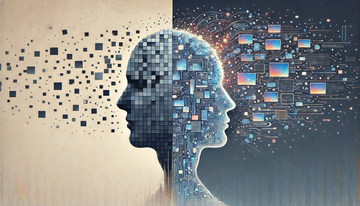Introduction: The Modern Epidemic of Overstimulation
Ever feel like your mind is always racing, like you can’t sit still without grabbing your phone, and no matter how much you consume—TikToks, podcasts, endless scrolling—you still feel unsatisfied?
That’s not just a bad habit—it’s a rewired brain struggling with dopamine overload.
In today’s world, we’re caught in an invisible trap: constant stimulation. Social media, streaming, notifications, video games, fast entertainment—it’s all designed to keep us engaged but never fulfilled. And the worst part? This endless noise isn’t just distracting—it’s stealing our focus, creativity, and ability to think deeply.
But here’s the good news: you can take your mind back.
Why Constant Stimulation is Wrecking Your Brain
We live in a time where boredom is extinct. The second we feel even a hint of stillness, we reach for something—our phones, the TV, a quick dopamine hit. This might seem harmless, but in reality, it’s creating serious damage to our focus, energy, and mental clarity.
Here’s why:
1. It Destroys Your Attention Span
Our brains aren’t wired to process constant bursts of new information every few seconds. When we flood our minds with fast, high-stimulation content, our ability to focus on deep, meaningful tasks weakens.
This is why:
• Reading a book feels harder than watching TikTok.
• Having a deep conversation seems boring compared to texting.
• Sitting in silence feels unbearable—because your brain craves more stimulation.
The result? A scattered, overstimulated mind that struggles with real-world tasks.
2. It Kills Motivation (Dopamine Desensitization)
Dopamine is the chemical that makes us feel motivated and excited. But when we constantly overstimulate it with artificial dopamine spikes (social media, porn, junk food, weed, binge-watching), we train our brains to expect rewards instantly.
This leads to:
• Procrastination → Hard tasks feel unbearable because they don’t give instant gratification.
• Low drive → Goals seem overwhelming because your brain is wired for short-term pleasure, not long-term success.
• Emotional numbness → Real-life experiences feel dull compared to digital ones.
Ever wonder why you can binge-watch 4 hours of Netflix but can’t focus for 10 minutes on your goals? This is why.
3. It Traps You in a Cycle of Anxiety & Restlessness
An overstimulated brain isn’t just distracted—it’s on edge.
• When we constantly consume new information, our brains don’t have time to process, reflect, or reset.
• This creates mental clutter, making us feel anxious, stressed, and overwhelmed.
• We become reactive instead of intentional, feeling like we’re always chasing something but never catching it.
And instead of slowing down, we reach for more stimulation to escape the discomfort, reinforcing the cycle.
How to Reclaim Your Mind & Focus Again
Escaping the overstimulation trap doesn’t mean quitting everything cold turkey—it means rewiring your brain for balance, clarity, and real engagement.
1. Start a Dopamine Reset (Break the Cycle)
A dopamine reset helps your brain return to natural motivation by removing artificial overstimulation for a set period (like 7-30 days).
Start with:
✅ No social media first thing in the morning (wait at least an hour).
✅ No short-form content for a week (TikTok, Reels, Shorts).
✅ Replace screen time with real activities (reading, journaling, deep work).
✅ Limit instant dopamine sources (junk food, porn, weed, mindless entertainment).
At first, you’ll feel restless—that’s your brain craving fast dopamine. But after a few days, you’ll feel sharper, calmer, and more in control.
2. Train Your Brain for Deep Focus
Once your brain starts resetting, it’s time to rebuild your ability to focus and think deeply.
Try this:
• Read 10-15 pages a day (slow, deep information rewires your focus).
• Do one task at a time (multitasking is a myth—train your brain for sustained attention).
• Practice mindfulness or meditation (even 5 minutes a day reduces mental clutter).
• Spend 30 minutes a day in boredom (let your brain process thoughts without distractions).
At first, your brain will resist—but soon, focusing will feel easier and more natural.
3. Reconnect with Real-World Stimulation
The goal isn’t just to remove distractions—it’s to replace them with real engagement.
🔹 Have deep, uninterrupted conversations (instead of mindless texting).
🔹 Go on a walk without your phone (retrain your brain to enjoy silence).
🔹 Create something instead of consuming (write, draw, build—engagement beats passive scrolling).
🔹 Get lost in an activity (flow state beats dopamine addiction).
This shift doesn’t just reduce distraction—it makes life feel richer, more meaningful, and more exciting.
Conclusion: The Power of an Unstimulated Mind
We’ve been conditioned to believe more stimulation = more happiness. But the truth is, real fulfillment comes from clarity, focus, and deep engagement.
If you feel mentally exhausted, unmotivated, or restless, the problem isn’t you—it’s the environment you’ve been conditioned to live in.
But you have the power to change that.
✅ Cut out mindless noise and reclaim your focus.
✅ Stop chasing artificial dopamine and rediscover real excitement.
✅ Create a life where you control your attention—no one else.
Your mind is your most powerful tool—it’s time to take it back.
A Personal Note: Why This Matters More Than Ever
We’re being bombarded with overstimulation every single day. It’s like feeding a dog endless processed human food—of course, it’ll eat, not knowing when to stop, until it’s too late.
In a way, we’re the same. We’re animals, after all. Without awareness, we’ll keep consuming whatever is thrown in our faces, believing it’s serving us—when in reality, it’s pulling us further away from clarity, purpose, and real fulfillment.
But here’s the truth: we have the power to change. No one is coming to pull us out of this cycle. Only we can decide to break free.
So let’s make that choice—not just for ourselves, but for everyone around us. A clearer mind isn’t just a personal victory. It’s the foundation for a better, more intentional world.
- Devin






